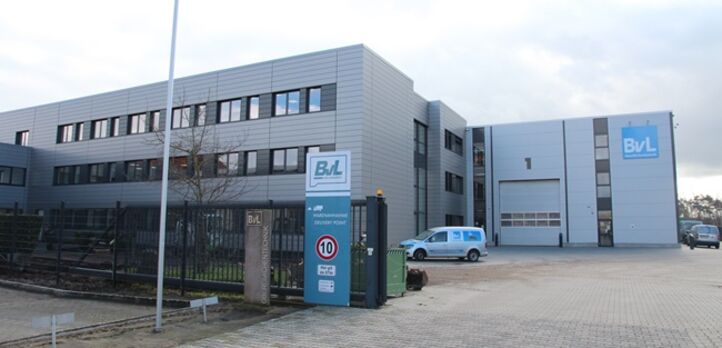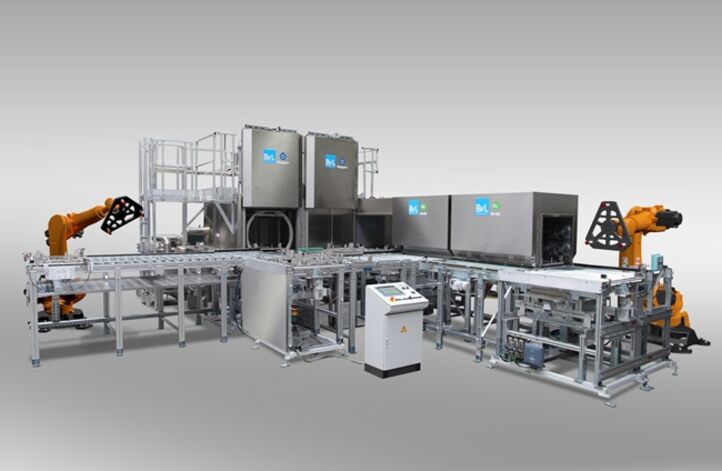Energy efficiency is always in mind at BvL
Resource conservation measures in construction projects and plant systems
The need to take action to protect the climate is a scientific fact and one of the most important issues of our time. On the terms of its Climate Protection Act, Germany aims to reduce emissions by at least 55 percent by 2030. In 2019, greenhouse gas emissions did fall year-on-year by 6.3 percent in Germany, according to figures from the German Federal Ministry for the Environment, Nature Conservation and Nuclear Safety. While this decline has also been made possible by corresponding activities in the manufacturing sector, maintaining and improving this trend is advisable and indeed essential. As a leading manufacturer of industrial cleaning systems, BvL Oberflächentechnik GmbH has long since introduced extensive measures to reduce energy usage in a wide range of relevant areas.
New premises: an energy-efficient building
Continuous growth and a positive trend in incoming orders have enabled BvL to take the step of undertaking major expansion work at its head office in Emsbüren, Lower Saxony. In mid-2019, two more buildings were added at the site, taking the total number of buildings used for production to five. Staff were also able to move into a new, energy-efficient office building (German KfW 55 class) in February this year. Compared with the reference building from German energy-saving regulations (EnEV), the new energy-efficient office building needs just 55 percent of primary energy. This significantly figure for lower primary energy consumption translates into an annual saving of almost 220,000 kWh of primary energy, which equates to an annual reduction of 55,829 kg of CO₂. These savings have been made possible by improved insulation standards for walls, roofing and the foundation, plus triple-glazed glass for window panes. Alongside the use of renewable energy sources, selected plant systems like heat pumps, efficient radiant heaters and ventilation systems with waste heat recovery provide eco-friendly heating for the building.
Resource-friendly plant systems and part usage in line with our vision
Energy efficiency as well as ecologically and socially responsible business activities are key elements of the BvL Oberflächentechnik vision statement. Accordingly, ensuring resources are used responsibly when designing and building cleaning systems and accessory system components has a major role to play at BvL. Extensive energy-saving measures come as standard in terms of cleaning system features. In reducing energy use, one key approach taken is to maximise the level of insulation applied to system parts such as pumps, filters and piping.
Smart cleaning: taking energy efficiency to the max
BvL employs a range of smart cleaning strategies to ensure that its cleaning systems are as environmentally friendly as possible. For many years now, all BvL cleaning systems have been fitted with Libelle Fluid Control as standard. With the help of associated sensor systems, bath quality is measured continuously to ensure that smaller volumes of water and cleaning agent need to be used compared to simply replacing the bath at regular intervals. Libelle Cleaner Control and Libelle Oil Control are also used by BvL to enable a more conservative use of resources: continuous measurement of cleaner and oil concentrations in the bath means that replacement only happens if and when necessary. The “Component ID” app used by the new Libelle Product Control uses a camera array to detect the optimum position and number of parts on the workpiece carrier – also so as to ensure maximum possible efficiency. At the same time, the system also switches to energy-saving standby mode as soon as it detects that no more components being fed into the system. Alongside the Libelle-based sensor system components, exhaust air is managed by an exhaust air control based on the relative humidity of the exhaust air, while optimum drying times are assured by the drying control, based on current humidity in the drying chamber.
Future projects with a focus on resource conservation
Development projects in the pipeline at BvL for cleaning systems and system components are also focused strongly on reduced resource use. In its 2030 Vision, the company has also set itself the goal of a “self-learning cleaning system”, for example. The idea here is to use AI in a way that means systems controlled by smart algorithms are independently capable of detecting system conditions and component/media parameters, comparing these continuously with actual/target states and learning from these results. Apart from reducing resource and personnel usage, the continuous process of monitoring and adaptation in these systems will ensure high-quality cleaning results over a longer period.

